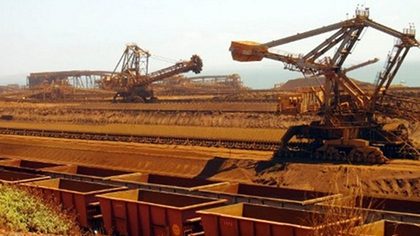SUMMARY
This is AI generated summarization, which may have errors. For context, always refer to the full article.

SYDNEY, Australia – Resources Minister Martin Ferguson may have declared the mining boom had passed, but the lucrative scramble to unearth the vast nation’s resources is not over yet, analysts say.
Ferguson sparked a flurry of debate about the unprecedented boom which helped Australia dodge recession during the global financial crisis when he said Thursday, August 23: “You’ve got to understand, the resources boom is over.”
The minister later said while commodity prices had peaked, the boom in terms of construction would continue, with Aus$270 billion (US$281.5 billion) in committed capital investment.
But coming after BHP Billiton delayed its multi-billion dollar expansion of its Olympic Dam copper and uranium mine and reported its first profit slump in three years, his remarks raised doubts about the health of the minerals rush.
Amid gloom in the eurozone and weakness in the United States economy, there are fears that slowing growth in China — a major market for iron ore and coal — could have a severe impact on Australia’s mining-powered economy.
With commodity prices falling, Deutsche Bank warned the country could slip into recession in 2013 as exports fell and cautioned against “over-confidence that the investment pipeline was locked in”.
Countering this, Reserve Bank of Australia governor Glenn Stevens said Friday he saw no immediate sign of an end to the mining boom.
“Looking ahead, the peak of the resource investment boom as share of GDP — the highest such peak in at least a century — will occur within the next year or two,” Stevens told a parliamentary hearing.
“After that the rate of resource investment is likely to decline, while the export shipments of the resources themselves will pick up.”
Quentin Grafton, chief economist at the Bureau of Resources and Energy Economics, said the surge in demand for raw materials generated by fast-growing economies such as China had triggered “the big daddy of them all” in terms of booms and would be around for some time.
“The boom has most certainly not ended, the price phase… where prices are continuously rising — well, that certainly has passed,” he said.
“We are now in a phase where investment is continuing to rise. At some stage or other that will eventually peak as well. And volumes are already rising and they will also continue to rise for quite a number of years to come.
“There’s a lot of legs in this boom left. A lot.”
Grafton said while price peaks were likely reached in 2011 and were now moderating, having fallen 20 or 30 percent in some cases, they were “still very much higher” than they were at the start of the boom in 2002-2003.
“So in that context, the boom still continues,” he told AFP.
Adrian Hart, senior manager infrastructure and mining at BIS Shrapnel, said despite the gloom, the massive Olympic Dam project could still go ahead.
“There’s this kind of feeling of death… but in many cases some form of these projects will go ahead and I expect them to go ahead in the second half of this decade,” he said.
He said while miners were holding back on some proposed projects, they weren’t “disappearing off our screen forever and we’ve lost them”.
“If anything, decisions like these, taken in Australia and around the world are a cyclical response to price but what they do is by constraining supply, when the next upswing in demand comes as it will,… (we will) have these projects in place to supply,” he said.
The centre-left Labor government of Prime Minister Julia Gillard had long touted its economic management, and any decline in mining revenues could hurt the budget which Gillard has vowed to return to surplus this fiscal year.
But there could also be flipside to some projects not proceeding.
“It has long been known that doing all the approved and proposed projects in a relatively short period of time was not going to be possible,” AMP Capital chief economist Shane Oliver said.
The delays will help spread the projects into the longer term, take pressure off excessive costs and provide a breathing space for those sectors of the “two-speed” economy which have suffered as mining has boomed, he said. – Agence France-Presse
For the existing mining contracts in the Philippines, view this #WhyMining map.
How does mining affect you? Are you pro or against mining? Engage, discuss & take a stand! Visit Rappler’s #WhyMining microsite for the latest stories on issues affecting the mining sector. Join the conversation by emailing whymining@rappler.com your views on the issue.
For other views on mining, read:
| Yes to Mining | No to Mining |
More on #WhyMining:
- Shaping the future of mining
- EO: No new mining contracts
- The Mining EO: A mixed bag
- Mining E.O. not perfect, but very good
- CONVERSATIONS: What are your thoughts on the mining EO? #WhyMining
- Mining E.O. pits gov’t vs local execs
- Correcting lies and disinformation
- Stand for the environment
- How can mining work for Philippines?
- Mining is a social justice issue
- REPLAY: #WHYMINING
Add a comment
How does this make you feel?
There are no comments yet. Add your comment to start the conversation.